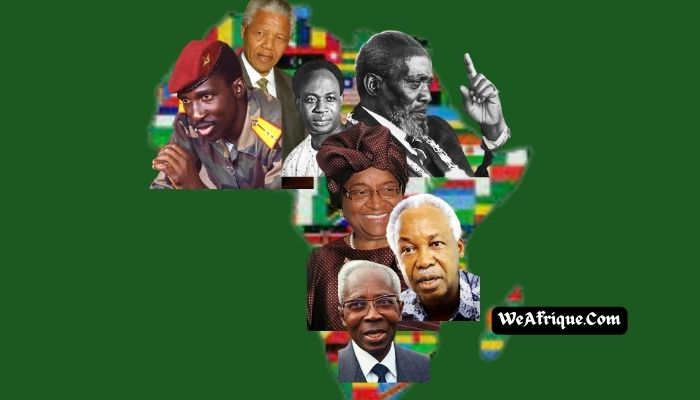Legacies Of Founding African Presidents.
Legacies of Founding African Presidents
Research by Beyonddennis
The dawn of independence across Africa in the mid-20th century was heralded by a generation of charismatic and visionary leaders who spearheaded movements for self-determination. These founding presidents inherited nations grappling with the profound effects of colonialism, tasked with forging unity, economic prosperity, and distinct national identities from a mosaic of diverse ethnicities and cultures. Their legacies are complex, marked by both monumental achievements and significant challenges that continue to shape the continent today.
Architects of Independence and Nation-Building
The primary and arguably most profound legacy of the founding African presidents lies in their successful struggle for independence. Figures like Ghana's Kwame Nkrumah, Tanzania's Julius Nyerere, Kenya's Jomo Kenyatta, and Senegal's Léopold Sédar Senghor became symbols of African liberation, inspiring movements across the continent and beyond. They skillfully navigated international diplomacy, mobilized local populations, and often endured imprisonment or exile in their quest for self-rule.
Upon achieving independence, these leaders faced the daunting task of nation-building. They established national institutions, drafted constitutions, and initiated policies aimed at fostering a sense of shared identity among diverse ethnic groups often arbitrarily grouped within colonial borders. Their efforts laid the groundwork for the modern African state, despite the inherent fragilities inherited from colonial demarcations and the "divide and rule" strategies of former colonial powers.
Economic Visions and Realities
The economic philosophies adopted by founding presidents varied widely, reflecting different ideological leanings and national contexts. Many, like Nkrumah of Ghana and Nyerere of Tanzania, embraced some form of socialism, often termed 'African Socialism'. Nkrumah pursued state-led industrialization and nationalization of key industries, aiming for economic self-reliance. Nyerere championed 'Ujamaa' or familyhood, a communalistic approach focused on rural development and collective agriculture, intended to prevent the emergence of class divisions and promote self-sufficiency.
Others, like Jomo Kenyatta in Kenya, adopted more capitalist-oriented policies, encouraging private enterprise and foreign investment, leading to significant economic growth in certain sectors but also contributing to wealth disparities. Léopold Sédar Senghor of Senegal pursued a mixed economy, blending elements of state planning with a market-oriented approach, while emphasizing cultural development alongside economic progress. The long-term success of these economic models was mixed; while some achieved initial gains in social services, many faced challenges such as corruption, inefficiencies, and external debt, ultimately struggling to lift large populations out of poverty.
Political Systems and Pan-Africanism
The political systems established by founding presidents often veered towards one-party states, justified by the need for national unity in nascent nations prone to ethnic fragmentation and external interference. Leaders argued that multi-partyism, a legacy of colonial political structures, could exacerbate divisions and hinder development. While this approach sometimes fostered stability and allowed for centralized planning, it also often suppressed dissent, limited political freedoms, and paved the way for authoritarianism and a lack of accountability.
A unifying thread among many of these leaders was the fervent belief in Pan-Africanism – the idea of a unified and independent Africa. Nkrumah was a vocal proponent of a United States of Africa, believing that only through continental unity could Africa truly achieve its potential and resist neo-colonialism. Nyerere was also a staunch advocate for African unity, playing a crucial role in the Organization of African Unity (OAU), the precursor to the African Union. This commitment to solidarity led to significant support for liberation movements in Southern Africa and collective diplomatic action on the world stage, establishing Africa as a distinct voice in international relations.
Social Development and Cultural Identity
Founding presidents placed significant emphasis on social development, particularly in education and healthcare, which had been severely neglected under colonial rule. Universal primary education was a common goal, seen as crucial for national development and for fostering an informed citizenry. Literacy campaigns were widespread, and new universities and hospitals were established across the continent, significantly expanding access to these vital services for millions.
Beyond material development, these leaders also sought to restore and promote African cultural identity, which had been devalued by colonialism. Léopold Sédar Senghor, a poet and philosopher, developed the concept of 'Négritude', emphasizing the richness and unique contributions of Black African culture to world civilization. Others encouraged the use of indigenous languages, promoted traditional arts, and sought to decolonize educational curricula, aiming to instill pride and confidence in their newly independent populations.
Enduring Impacts and Critical Reflections
The legacies of founding African presidents are continually debated and re-evaluated. On one hand, they are celebrated as liberation heroes who shattered the chains of colonialism, laid the foundations for modern African states, and championed a vision of an independent and unified continent. Their contributions to education, health, and infrastructure development are undeniable.
On the other hand, their tenures also saw the rise of authoritarianism, economic mismanagement, corruption, and the suppression of political dissent in many instances. The long-term effects of one-party rule and the cult of personality that often surrounded these leaders contributed to political instability and democratic deficits in later decades. The economic models they adopted, while well-intentioned, often failed to deliver sustainable prosperity or address growing inequalities. The challenges they faced were immense, including Cold War pressures, inherited colonial structures, and internal ethnic tensions, yet the choices they made continue to reverberate through African societies. Understanding their complex legacies is crucial for comprehending the contemporary political, economic, and social landscape of Africa.
